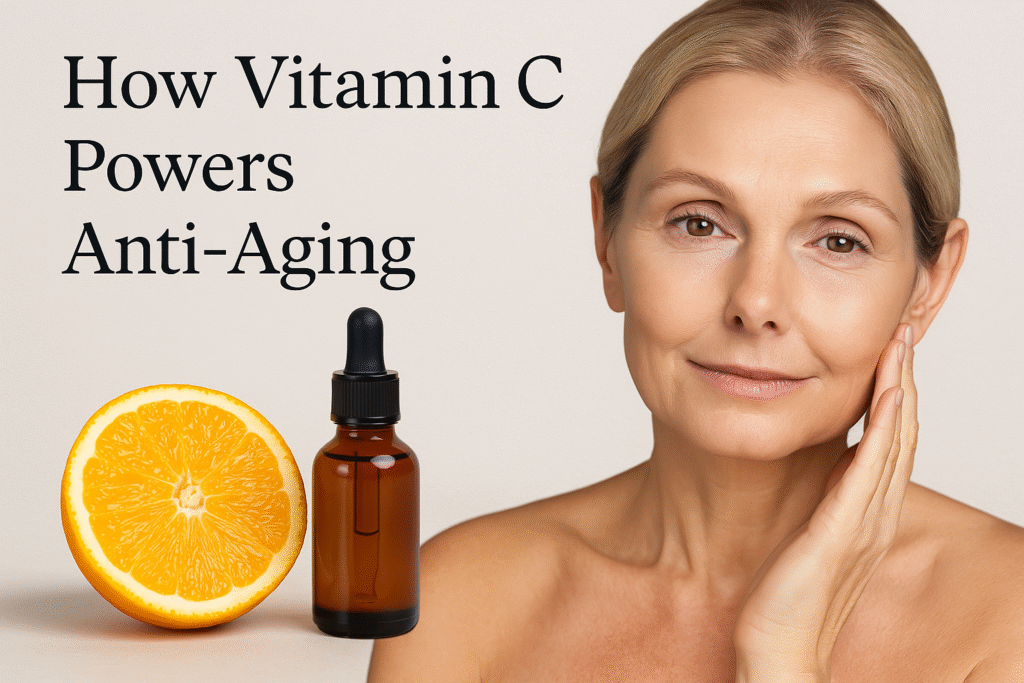Discover how Vitamin C has become a cornerstone in modern skincare, harnessing science to slow down visible signs of aging. From its antioxidant prowess to its collagen-boosting abilities, we’ll unpack every angle so you can optimize your routine and reveal a healthier, more youthful complexion.
Introduction to Vitamin C and Aging
Aging is a natural process driven in part by oxidative stress—when free radicals damage skin cells over time. Vitamin C, also known as ascorbic acid, steps in as a powerful antioxidant, neutralizing these free radicals before they can break down collagen and elastin fibers. By incorporating Vitamin C into your daily regimen, you’re giving your skin a layer of defense against environmental aggressors and premature aging.
The Science Behind Vitamin C and Skin Aging
Free radicals form when your skin is exposed to UV radiation, pollution, and even stress. These unstable molecules steal electrons from healthy cells, triggering inflammation and breakdown of structural proteins. Vitamin C donates electrons to stabilize free radicals, cutting off this chain reaction and reducing oxidative damage at the source.
Vitamin C also scavenges reactive oxygen species (ROS), which accumulate over time and dull your complexion. By clearing ROS, Vitamin C helps maintain skin clarity and resilience, making it a linchpin in anti-aging strategies.
Vitamin C’s Role in Collagen Synthesis
Collagen provides skin with its firmness and elasticity. As we age, natural collagen production slows, leading to fine lines and sagging. Vitamin C is essential for the enzymes that link collagen strands during synthesis. Without adequate Vitamin C, newly formed collagen is weaker and more prone to degradation.
Research shows that topical Vitamin C stimulates both collagen production and gene expression related to skin repair. This dual action not only smooths existing lines but also fortifies your skin’s supportive matrix for long-term resilience.
Topical vs. Dietary Vitamin C: A Dual Approach
While fruits like oranges, strawberries, and kiwis deliver systemic benefits, topical formulations concentrate Vitamin C directly into the skin’s outer layers where it’s needed most.
- Dietary Vitamin C
- Boosts overall immune function
- Supports collagen formation from within
- Requires digestion, so only a fraction reaches the skin
- Topical Vitamin C
- Penetrates the epidermis to fight free radicals on contact
- Directly stimulates skin cell turnover
- Must be properly formulated (pH 2.5–3.5) for stability and absorption
For maximum anti-aging impact, combine both approaches: eat Vitamin C–rich foods daily and apply a clinically proven topical serum each morning.
Choosing the Right Form of Topical Vitamin C
Not all Vitamin C derivatives perform equally. Here’s a quick breakdown:
| Form of Vitamin C | Key Trait | Best For |
|---|---|---|
| L-Ascorbic Acid | Highest potency, fast-acting | Normal to oily skin |
| Sodium Ascorbyl Phosphate | Stable, less irritating | Sensitive and acne-prone skin |
| Ascorbyl Palmitate | Fat-soluble, gentle | Dry or mature skin |
Pick a formulation that suits your skin type, and always check concentration—aim for 10–20% L-Ascorbic Acid for visible anti-aging results without undue irritation.
Step-by-Step: Incorporating Vitamin C into Your Routine
- Cleanse
Begin with a gentle, pH-balanced cleanser to remove oils and debris. - Patch Test
Apply a small dot of serum on your inner forearm. Wait 24 hours to ensure no redness or stinging develops. - Serum Application
Dispense 2–3 drops of Vitamin C serum onto fingertips and pat evenly across face and neck. Allow 1–2 minutes for absorption. - Moisturize
Lock in hydration with a lightweight moisturizer to support barrier function. - Sun Protection
Follow with broad-spectrum SPF 30 or higher. Vitamin C boosts sunscreen efficacy and helps repair sun-induced free radical damage. - Consistency
Use daily in the morning. For extra support, reapply sunscreen and a thin layer of serum if you’ll be outdoors for extended periods.
Common Pitfalls and Troubleshooting
- Oxidation
Vitamin C serums can darken if exposed to air or light. Store in opaque, airtight containers and discard if color shifts to brown. - pH Mismatch
Efficacy drops when pH rises above 3.5. Stick with trusted brands that specify formulation pH. - Combining with AHAs/BHAs
Layering strong acids on top of Vitamin C can lead to irritation. If you use exfoliating acids, alternate nights or apply them at different times of day. - Skipping SPF
Vitamin C makes your skin more sensitive to UV exposure. Never skip sunscreen after applying a Vitamin C product.
By recognizing these issues and adjusting your regimen, you’ll keep your skin calm, protected, and primed for anti-aging benefits.
Beyond the Face: Body Care with Vitamin C
Don’t limit Vitamin C to facial serums. Body lotions and gels infused with ascorbic acid can tackle sagging upper arms, dimpling thighs, and even stretch marks. Look for lightweight, fast-absorbing textures that leave no greasy residue, ensuring you get full-body anti-aging support without the slick finish.
Real-Life Transformations
Thousands of users report smoother texture, diminished fine lines, and a brighter complexion after just a few weeks of consistent use. Integrating Vitamin C into both diet and skincare delivers the dual-action power your skin needs to resist and reverse the visible signs of aging.
Conclusion
Vitamin C stands out among anti-aging ingredients for its scientific backing, versatility, and proven ability to neutralize free radicals while driving collagen synthesis. By choosing the right form, incorporating it correctly into your routine, and pairing it with healthy lifestyle habits, you can unlock smoother, firmer, and more radiant skin.
Ready to power up your skincare? Start today with a high-quality Vitamin C serum, commit to daily use, and watch your skin transform—because age may be inevitable, but visible aging doesn’t have to be.
Looking for more expert skincare advice? Check out our next post on “Retinol vs. Vitamin C: Building the Ultimate Anti-Aging Routine.”
